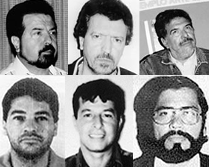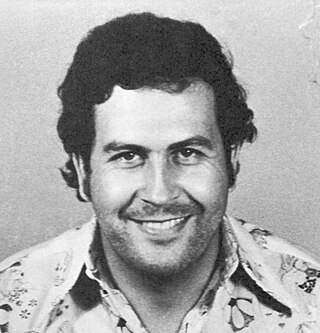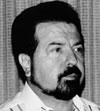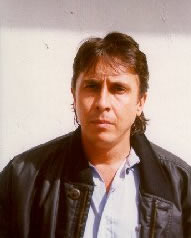Related Research Articles

Pablo Emilio Escobar Gaviria was a Colombian drug lord, narcoterrorist, and politician, who was the founder and sole leader of the Medellín Cartel. Dubbed "the king of cocaine", Escobar was one of the wealthiest criminals in history, having amassed an estimated net worth of US$30 billion by the time of his death—equivalent to $70 billion as of 2022—while his drug cartel monopolized the cocaine trade into the United States in the 1980s and early 1990s.

The Cali Cartel was a drug cartel based in southern Colombia, around the city of Cali and the Valle del Cauca. Its founders were the brothers Gilberto Rodríguez Orejuela, Miguel Rodríguez Orejuela and José Santacruz Londoño. They broke away from Pablo Escobar and his Medellín associates in 1988, when Hélmer "Pacho" Herrera joined what became a four-man executive board that ran the cartel.

The Medellín Cartel was a powerful and highly organized Colombian drug cartel and terrorist organization originating in the city of Medellín, Colombia, that was founded and led by Pablo Escobar. It is often considered to be the first major "drug cartel" and was referred to as such; due to the organization's upper echelons and overall power-structure being built on a partnership between multiple Colombian traffickers operating alongside Escobar. Included were Jorge Luis Ochoa Vásquez, Fabio Ochoa Vásquez, Juan David Ochoa Vásquez, José Gonzalo Rodríguez Gacha and Carlos Lehder. Escobar's main partner in the organization however was his cousin Gustavo Gaviria who handled much of the cartel's shipping arrangements and the more general and detailed logistical aspects of the cocaine trafficking routes and international smuggling networks which were supplying at least 80% of the world's cocaine during its peak. Gustavo, also known as León seems to have also had a strong hand in the cartel's unprecedented acts of narcoterrorism, right alongside his cousin Pablo and was considered to be second in command of the cartel and therefore one of Colombia's most wanted men, with both him and Escobar having arrest warrants pending from other nations where their criminal activity had spread to, such as in Spain and the U.S. Meanwhile, Pablo Escobar's brother Roberto Escobar acted as the organization's accountant. The cartel operated from 1976 to 1993 in Colombia (Antioquia), Bolivia, Panama, Central America, Peru, the Bahamas, the United States, as well as in Canada.

La Catedral was a personal prison overlooking the city of Medellín, in Colombia. The prison was built to specifications ordered by Medellín Cartel leader Pablo Escobar, under a 1991 agreement with the Colombian government in which Escobar would surrender to authorities and serve a maximum term of five full years and the Colombian government would not extradite him to the United States.

Luis Carlos Galán Sarmiento was a Colombian liberal politician and journalist who ran for the Presidency of Colombia on two occasions, the first time for the political movement New Liberalism that he founded in 1979. The movement was an offspring of the mainstream Colombian Liberal Party, and with mediation of former Liberal president Julio César Turbay Ayala, Galán returned to the Liberal party in 1989 and sought the nomination for the 1990 presidential election, but was assassinated before the vote took place.

Carlos Enrique Lehder Rivas is a German Colombian former drug lord who was co-founder of the Medellín Cartel. Born to a German father and Colombian mother, he was the first high-level drug trafficker extradited to the United States, after which he was released from prison in the United States after 33 years in 2020. Originally from Armenia, Colombia, Lehder eventually ran a cocaine transport empire on Norman's Cay island, 210 miles (340 km) off the Florida coast in the central Bahamas.

Gilberto José Rodríguez Orejuela was a Colombian drug lord and one of the leaders of the Cali Cartel. Orejuela formed the cartel with his brother, Miguel Rodríguez Orejuela, José Santacruz Londoño, and Hélmer Herrera. The cartel emerged to prominence in the early 1990s, and was estimated to control about 80 and 90 percent of the American and European cocaine markets respectively in the mid-1990s. Rodríguez Orejuela was captured after a 1995 police campaign by Colombian authorities and sentenced to 15 years in prison. He obtained early release in 2002, and was re-arrested in 2003, after which he was extradited to the United States. There, he was sentenced to 30 years in prison, where he died in 2022.
The Norte del Valle Cartel, or North Valley Cartel, was a drug cartel that operated principally in the north of the Valle del Cauca department of Colombia, most notably the coastal city of Buenaventura. It rose to prominence during the 1990s, after the Cali and Medellín Cartels fragmented, and it was known as one of the most powerful organizations in the illegal drug trade. The drug cartel was led by the brothers Luis Enrique and Javier Antonio Calle Serna, alias "Los Comba", until its takedown in 2008 by the authorities of the Colombia, Venezuela and with cooperation of the United States DEA.

Diego Fernando Murillo Bejarano, also known as Don Berna or Adolfo Paz, is a former leader of the United Self-Defense Forces of Colombia paramilitary group, as well as the leader of The Office of Envigado cartel.

Miguel Ángel Rodríguez Orejuela is a convicted Colombian drug lord, formerly one of the leaders of the Cali Cartel, based in the city of Cali. He is the younger brother of Gilberto Rodríguez Orejuela. He married Miss Colombia 1974, Martha Lucía Echeverry.

José Gonzalo Rodríguez Gacha, also known by the nicknames 'Don Sombrero' and El Mexicano, was a Colombian drug lord who was one of the leaders of the Medellín Cartel along with the Ochoa brothers and Pablo Escobar. At the height of his criminal career, Rodríguez was acknowledged as one of the world's most successful drug dealers. In 1988, Forbes magazine included him in their annual list of the world's billionaires.

Fabio Ochoa Vásquez is a former leading member of the Medellín cocaine trafficking cartel, along with his older brothers Juan David and Jorge Luis. His role briefly made him a billionaire. After serving a brief prison term in Colombia, he was arrested and extradited to the US in 1999 and is serving a 30-year term in US federal prison.

Jorge Luis Ochoa Vásquez is a Colombian former drug trafficker who was one of the founding members of the notorious Medellín Cartel in the late 1970s. The cartel's key members were Pablo Escobar, Carlos Lehder, José Gonzalo Rodríguez Gacha, Gustavo Gaviria, Jorge Ochoa, and his brothers Juan David and Fabio.
José Rafael Abello Silva was a top-ranking member of Colombia's notorious Medellín Cartel. He was considered among the major drug traffickers in the Santa Marta region and the reputed chief of Caribbean coast operations on the cartel's behalf. During January 1987, Abello was included in a group of 128 major narcotics figures whose capture was ordered by President Virgilio Barco. Although he was captured in Barranquilla during that same month, he was released shortly thereafter, apparently with the help of Miguel Pinedo Barros, a senator in La Guajira and reputed protector of cocaine traffickers.

Rodrigo Lara Bonilla was a Colombian lawyer and politician, who served as Minister of Justice under President Belisario Betancur, and was assassinated by orders of Pablo Escobar because of his work as Minister in prosecuting cocaine traffickers mainly belonging to the Medellín Cartel.

The illegal drug trade in Colombia has, since the 1970s, centered successively on four major drug trafficking cartels: Medellín, Cali, Norte del Valle, and North Coast, as well as several bandas criminales, or BACRIMs. The trade eventually created a new social class and influenced several aspects of Colombian culture, economics, and politics.
The North Coast Cartel was a drug cartel operating in northern Colombia between in 1980 and 2010, mostly controlling the area of the Colombian Caribbean coast illegal drug trade flow from other regions of Colombia and neighboring countries and local production. Its operations center was the city of Barranquilla. Other name was the Barranquilla Cartel.
A drug lord, drug baron, kingpin, or lord of drugs is a type of crime boss, who is in charge of a drug-trafficking network, organization, or enterprise.
La Oficina de Envigado is a drug cartel and criminal organization originally founded as an enforcement wing and debt collection service of Pablo Escobar's Medellín Cartel. Despite being noted for its historical affiliation with drug trafficking and other organized crime activities, Oficina de Envigado's criminal activities were no longer centered on direct involvement in such activity by 2019 and are now mainly focused on providing services to lower level drug traffickers and mafia groups. It operates throughout Colombia, but mainly in the cities of Medellín and Envigado. It also controlled extortion, gambling, and money laundering businesses within the Valle de Aburrá that surrounds Medellín. It positioned itself as the chief mediator and debt collector in drug trafficking disputes and maintained major connections with Colombian paramilitaries and guerillas.

Drug barons of Colombia refer to some of the most notable drug lords which operate in illegal drug trafficking in Colombia. Several of them, notably Pablo Escobar, were long considered among the world's most dangerous and most wanted men by U.S. intelligence. "Ruthless and immensely powerful", several political leaders, such as President Virgilio Barco Vargas, became convinced that the drug lords were becoming so powerful that they could oust the formal government and run the country.
References
- 1 2 3 4 5 Killing Pablo cnn.com, 25 May 2003
- 1 2 Breaking out is hard to do economist.com, from 16 July 2015
- ↑ Should drug lord Guzman have been extradited to the US? bbc.co.uk, date 13 July 2015